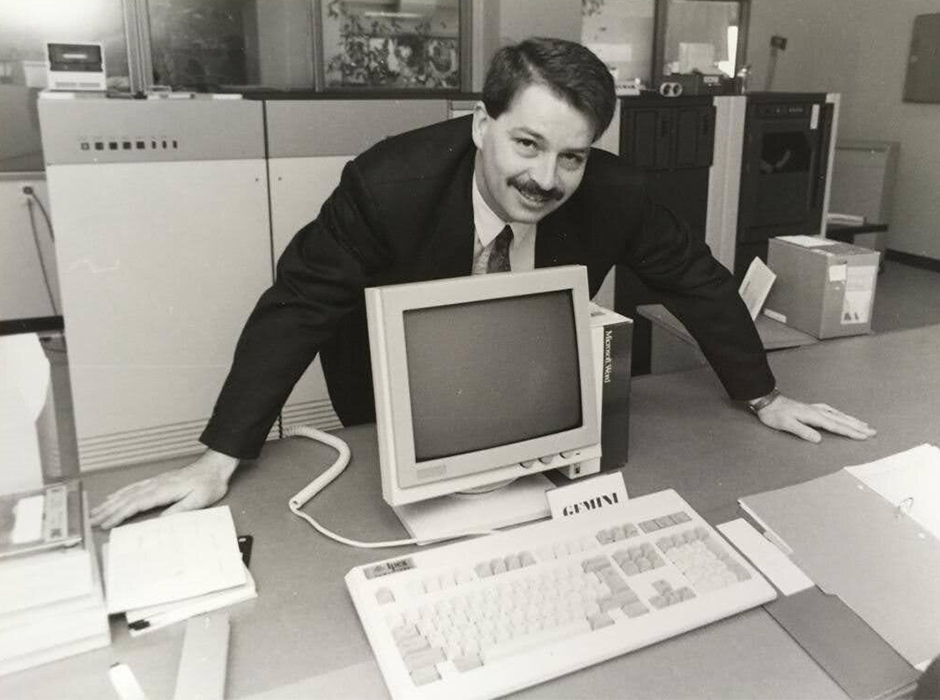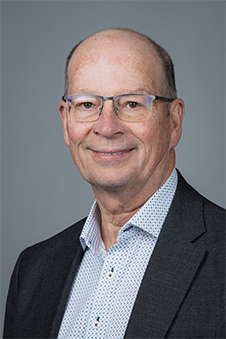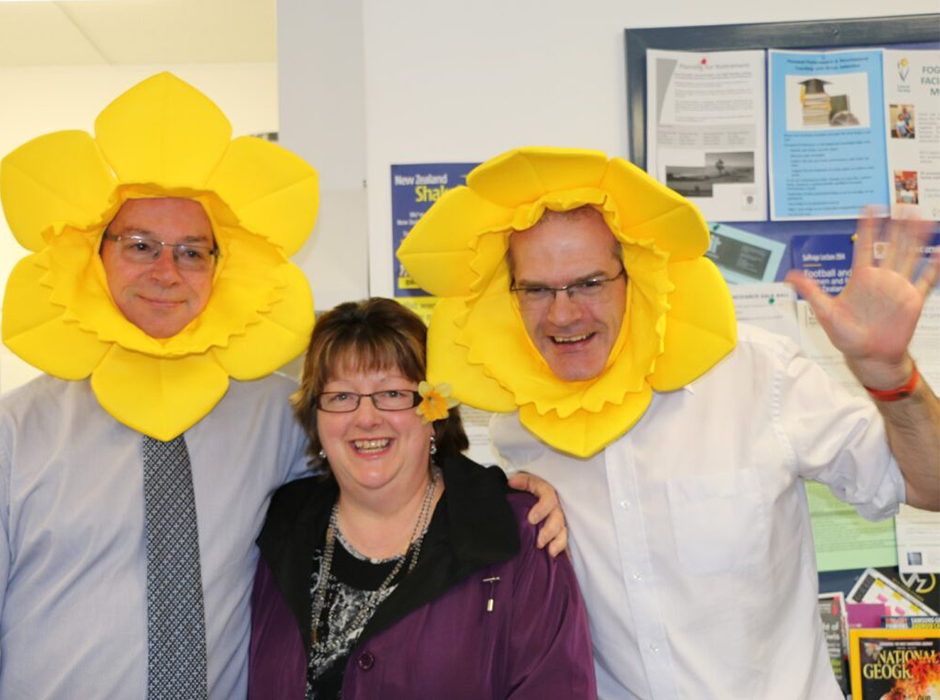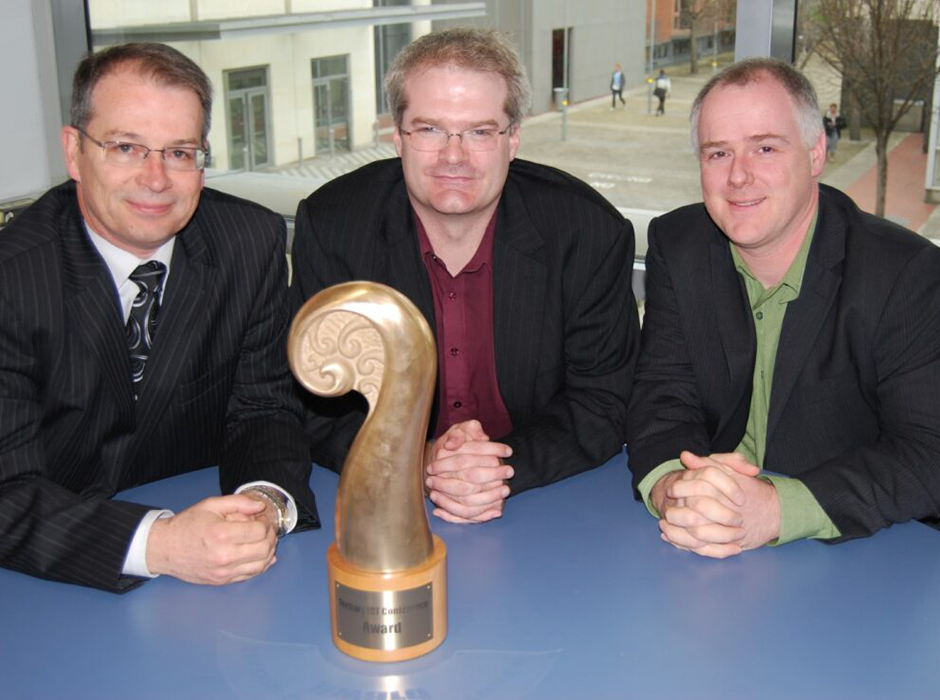
Back in the day … Information Technology Services Director Mike Harte with earlier technology at the Dunedin City Council in 1990 – 15 years before he arrived at our University.
The University’ of Otatgo's Information Technology Services Director Mike Harte is retiring on 20 April after almost 19 years at Otago, so Communications Advisor Gail Goodger sat down for a korero about his time here and about the strengths, weaknesses, opportunities, and threats in an area that affects us all. She also collected thoughts from some long-term staff of his about their leader.
Mike Harte
“He’s a great human being and will be so missed,” are just some of the words swirling around as Mike Harte gets ready to leave Information Technology Services (ITS).

Information Technology Services Director Mike Harte
His staff also say he is “super-approachable”, “willing to listen”, “remarkably even keeled no matter what might have been happening”, “caring”, “empathetic”, “a cool person to work for”, and a “funny and fun” leader who “genuinely cares about how staff are feeling, doing and coping”.
The most common word is supportive and the most common theme is Mike’s ability to trust his staff to do their jobs and keep him in the loop, while always making time when they need him.
He also gave staff space to try new things without fear and will absolutely back any initiative he believes in, or staff need give him a really good reason to back it.
Mike has taken the wider pressure on ITS on his own shoulders and been a great person to lead during change, both at our University and during people’s careers – “his faith in me gave me faith,” says one staff member.
Mike says he thought of himself as a conductor, interpreting our University’s goals and guiding staff across all IT disciplines towards achieving those aims as harmoniously as possible.
Discovery
Relationships have been important from the start, as he worked to untangle an IT devolution so extensive that when he wanted the Outlook email tool on his arrival, his division could not provide it, he had to ask Commerce to add him to its Outlook server.
People were calling ITS the ‘division of no’ because his staff had to recover costs by charging for helping other staff, have monthly charges for network ports (computers’ plug-in, wall socket connection to the University IT network) and the ‘seat hours’ students used in lecture theatres.
Wanting to avoid fees, divisions funded their own IT some even had their own IT networks separate from our University’s for transmitting, sharing, and storing information.
“It was the wild west,” says Mike, “there were more IT staff outside of ITS than there were inside. It took me ages to work out who was responsible for what. So, I’ve chipped away, piece by piece, bit by bit.”
He influenced change by showing people a University-wide network would be reliable, eliminating some fees, proving bulk buying IT was cheaper, having in-person support on campus was better, researchers could get what they needed without creating their own IT solutions, and the advantages of integrated, consistent, and secure systems.
During wide-ranging changes across professional services several years ago, “I would get accosted in the street by people who would tell me all the things wrong with IT and why their department was special. People are never short of an opinion in this place, which is one of the things I like about it. The good moments outweighed the bad for sure”.

Raising funds to help combat cancer … wearing daffodil headgear, Information Technology Services Director Mike Harte (left) and Emerson Pratt who is currently head of IT Support Services, with IT administrator and fundraising coordinator Denise Moulin.
Priority One
On arrival in 2005, Mike was also surprised to discover our University had only one IT data centre (servers and storage) so immediately prioritised creating a back-up.
At that stage, he was the only person using a laptop at leaders’ meetings, with some thinking open laptop lids created barriers between people – it was two years before iPhones were launched, in 2007.
Priority Two
Mike also immediately lobbied for a wireless network so people would no longer have to plug into a wall-mounted port to use computers. While Otago students did not have their own computers yet – they used the 2500-plus in our computer labs and libraries – he had seen overseas Wi-Fi networks so knew what was coming.
The first Wi-Fi went into our libraries and residential colleges for students “on the smell of an oily rag”. Now our University has “one of the largest Wi-Fi networks in the country, a giant Wi-Fi cocoon”, Mike says.
His driving force for continuous upgrades comes from the headline “Internet Totally Shithouse” in student magazine Critic in 2013, after students actually measured Dunedin campus internet speeds.
By then, students usually had a laptop and smartphone each, and were streaming data-heavy YouTube and movies. We could not keep up: “I used to have students beating down my door every single day”.
Mike still has that Critic article, even though students’ door-knocking stopped years ago, because he never wanted to “lose sight of our most important customers”.
Harnessing the power
Researchers also started needing to send gigantic chunks of data (terabytes) around the country and overseas, so his team collaborated to get them onto the global ultra-speed IT highway – “in the days when I started, that was just a pipe dream”.
Research also now uses about 80-90 percent of our University’s massive storage, no longer housed only on-campus but in the cloud too, in data centres around the world.
Proudest
Mike is most proud of his people’s response to the COVID pandemic lockdown announcement in March 2020, when they transitioned our entire University in three days from on-campus to online teaching, learning and research.
“We had to do all sorts of things for that to happen.”
As significant roadblocks emerged staff, with multiple skills from different IT disciplines “swarmed” to find a way through, then moved on to the next problem. ITS also created online drop-in sessions for staff wanting support and delivered IT equipment to homes, while supplying students with everything from laptops to Wi-Fi as well.
ITS staff and many others worked huge hours so lectures resumed the following week, believed to be the fastest University response nationwide: “That’s something we should be hugely proud of,” Mike says.
Luckily, New Zealand had invested in ultra-fast broadband about five years earlier, our University had invested in Zoom, ITS had Office365 to create a virtual campus so staff could access all our systems from home just by logging on, and our staff managed to get supervised online exams running within six weeks.

Rewarding times … With our University’s first Tertiary Information and Communications Technology (ICT) Excellence Award, – for the system that linked lecture theatres to cater for such large numbers of health sciences students all wanting to attend the same lectures, they could not fit in one room – (from left) Information Technology Services Director Mike Harte, Emerson Pratt who is currently head of IT Support Services, and then audio-visual design team leader Fraser Foster.
Cybercrime explosion
Centralised IT was a massive strength then, Mike says, and it has also boosted our ability to tackle cyber criminals – constantly evolving cybercrime is the world’s third largest economy, behind the United States and China.
To stop cyber criminals stealing our intellectual property (including research) and people’s identities, we need to know all our IT has security patches that combat the latest threats because “it’s an arms race”.
Cybercrime is such a threat, the spy agency – Government Communications Security Bureau (GCSB) – regularly briefs universities’ staff about the latest developments.
During Mike’s time, cybersecurity training was introduced and many other initiatives that recently led to our cybersecurity maturity being officially recognised officially – but we must be eternally vigilant.
IT threat
Another major risk is being able to attract IT staff in a fiercely contested worldwide market.
The drawcard of the breadth and depth of university projects and technologies can “only go so far, we can’t afford to fall back on the money [wages] because people will be swayed over to the corporates”, Mike says.
Dunedin is no longer significantly cheaper to live and IT people can work from the city for anyone, anywhere – a job applicant turned us down recently because an overseas employer would pay twice as much and build them a home office.
Mike says his people will tackle problems even in the small hours: “They’re dedicated, they respond because they’re professional and they care, and a lot of that is behind the scenes without anyone noticing.
“There are some things that make this place great and we can’t afford to lose them. We’ve got to remember … that without people, we don’t have a University. If we have people who feel like they belong and are valued, that’s the most important thing. We need an environment where people can do their best work and enjoy themselves.”
Opportunities
In the future, our University will vie for staff to do jobs that do not even exist yet, as rapidly developing artificial intelligence (AI) offers our University unknown opportunities, Mike says.
He is already trialling Copilot – Microsoft’s version of ChatGPT – so can pop a meeting agenda into that AI, ask it to review all relevant content in his Teams, documents, emails, and chats, then ask it to tell him the top five questions he needs to ask.
But before Copilot can be introduced more widely, we need to know how far it can reach while gathering data internally to avoid any unintended consequences in a vast University network.
New journey
In retirement, Mike will stay in Dunedin with wife Anne, who is “a rock. I wouldn’t have been able to achieve what I have in my career without her”.
They will road trip nationwide and head overseas. He will still remain a Trustee of the Able Charitable Trust – supporting families of people affected by mental distress and addiction – because “that’s very special to us and I enjoy it”.
Giving back has already earnt him two life memberships, from Local Government Information Management and the International Science Festival – which are among a dozen extra roles over the years.
Otago IT’s future
Mike has known his successor Steven Turnbull for years – from the Otago Polytechnic then the national polytech Te Pūkenga – so is sure he is leaving us in good hands.
“I feel this wonderful sense of handing over to someone who’s going to do a great job and that’s really special for me. I’ve invested a lot of my soul in this place and it’s nice to know it’s going to be looked after by someone who is going to take it to a whole new level.”